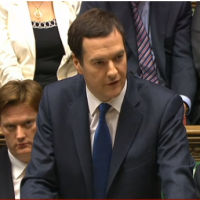
The Telegraph said that at meetings held by the International Monetary Fund over the past few days, Osborne claimed that a sharp fall in the value of sterling and tightening of credit conditions would raise Bank base rate-linked mortgage payments.
Osborne cited recent minutes from the Bank’s Monetary Policy Committee (MPC) meeting, which he said demonstrated a “clear warning” that rates may need to be raised in order to keep inflation under control.
The Bank raised concerns during its last interest rate meeting that a Brexit scenario could result in “significant implications” for the value of sterling.
Osborne said: “You would have rising prices and a Bank of England with an inflation target committed to respond to that. Because of financial stress and the financial stability consequences – you would [also] have a tightening of credit conditions as well in the market which would also have an impact on mortgage rates.”
A 200-page assessment published by the Treasury today on the risks to the UK of leaving the EU, concluded: “For mortgage rates, the additional impact of heightened uncertainty on credit conditions would put upward pressure on mortgage spreads.”
The analysis suggests that UK households will be worse off by £4,300 a year per household if Britain votes to leave the European Union. The Treasury plans to publish further research on the short-term economic implications associated with leaving the EU in due course.
Osborne said the report provided “rigorous analysis” of the long-term impacts of leaving the EU while providing a number of alternatives.
“The analysis shows that a vote to leave would mean Britain would be permanently poorer, to the tune of £4,300 a year for every household. Under any alternative, we’d trade less, do less business and receive less investment. And the price would be paid by British families. Wages would be lower and prices would be higher.
“Leaving the EU would be the most extraordinary self-inflicted wound,” he added.















